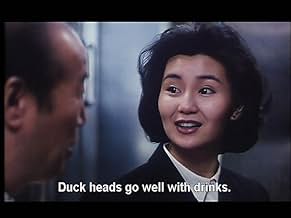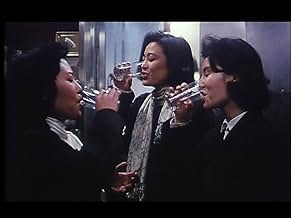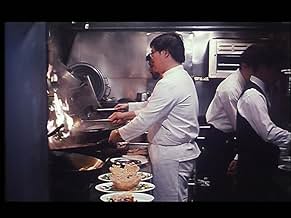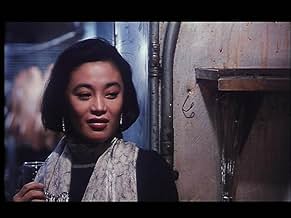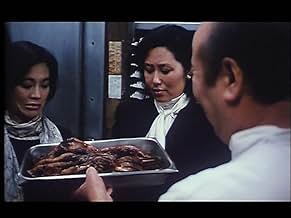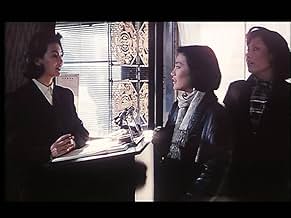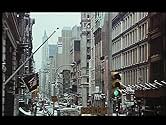Agrega una trama en tu idiomaThree very different Asian women forge a friendship in New York.Three very different Asian women forge a friendship in New York.Three very different Asian women forge a friendship in New York.
- Premios
- 8 premios ganados y 3 nominaciones en total
Siqin Gaowa
- Zhaohong
- (as Gaowa Siqin)
Luke Valerio
- David
- (as Luciano Valerio)
Vincent J. Mazella
- Bartender
- (sin créditos)
Charlie Sara
- John
- (sin créditos)
- Dirección
- Guionistas
- Todo el elenco y el equipo
- Producción, taquilla y más en IMDbPro
Argumento
¿Sabías que…?
- ConexionesFeatured in Nian ni ru xi (1997)
Opinión destacada
A year after making his brilliant Cantonese supernatural romance Rouge, Stanley Kwan came to Manhattan to film Full Moon in New York, which gives us a slice of life type story of three women who are different in many ways, but share a common heritage. I believe the intention was to show the diversity within the Chinese community, some of the struggles of its members in America, and the strength in friendship and unity. It's not a bad concept, and with Maggie Cheung, Sylvia Chang, and Gaowa Siqin you could certainly do worse, but each of the subplots isn't developed or resolved in ways that made this film particularly satisfying. Kwan himself said the film "turned out to be an embarrassment," but that's probably too harsh, as there are several wonderful little moments to be found here.
One woman (Chang) is an actress from Taiwan dating a broke white guy and soon to break up with him; another (Cheung) is from Hong Kong and works in her father's restaurant, she's bisexual and just ending a lesbian relationship; the third (Siqin) is a new bride from mainland China who has just married an "Americanized" Chinese man. In a parallel to these very different lives, one mentions about the restaurant, "It's a Hunan place run by Cantonese serving Peking duck," or words to that effect. The three women form a friendship despite some disagreements initially when Siqin's character says simply, "We're all Chinese, why argue?" and that seems to be the spirit of the film.
Each woman is buoyant and strong, but we see bits of their difficulties. Cheung's character is harassed on the street and she responds by chasing the guy down and whacking him with her shoe. Chang's character goes to an audition where a white director has the nerve to ask her why she as a Chinese woman thinks she can play Macbeth (grrr, and her response is brilliant). Siqin's character wants to bring her suffering mother over to live with them, which is perfectly natural in the traditional culture, but the idea is met with disdain from her husband.
The film is not helped by its subpar audio, which has tinny vocals and strange attenuation. It's also not helped by how the stories aren't fully developed, or complete their arcs. Cheung's character's lesbian past is limited to moments being essentially stalked, and an indication she wants to date a man now, but there is no real introspection. After Siqin's character walks out on her husband, we get no further scene of conflict or resolution. Lastly, Chang's character has a father who from the KMT, and is helping a woman who suffered during the Cultural Revolution to write a book. In one of the stronger visual moments of the film, her gaze and brief words inform us that he's actually abused her himself, in order to give her injuries he can then attribute to the Communist government. The idea of that felt ridiculous and wrong to me, and on top of that it was expressed in far too brief a manner, then simply left dangling.
The film has its heart in the right place and it's possible you like it better, but unfortunately for me it comes up a little short.
One woman (Chang) is an actress from Taiwan dating a broke white guy and soon to break up with him; another (Cheung) is from Hong Kong and works in her father's restaurant, she's bisexual and just ending a lesbian relationship; the third (Siqin) is a new bride from mainland China who has just married an "Americanized" Chinese man. In a parallel to these very different lives, one mentions about the restaurant, "It's a Hunan place run by Cantonese serving Peking duck," or words to that effect. The three women form a friendship despite some disagreements initially when Siqin's character says simply, "We're all Chinese, why argue?" and that seems to be the spirit of the film.
Each woman is buoyant and strong, but we see bits of their difficulties. Cheung's character is harassed on the street and she responds by chasing the guy down and whacking him with her shoe. Chang's character goes to an audition where a white director has the nerve to ask her why she as a Chinese woman thinks she can play Macbeth (grrr, and her response is brilliant). Siqin's character wants to bring her suffering mother over to live with them, which is perfectly natural in the traditional culture, but the idea is met with disdain from her husband.
The film is not helped by its subpar audio, which has tinny vocals and strange attenuation. It's also not helped by how the stories aren't fully developed, or complete their arcs. Cheung's character's lesbian past is limited to moments being essentially stalked, and an indication she wants to date a man now, but there is no real introspection. After Siqin's character walks out on her husband, we get no further scene of conflict or resolution. Lastly, Chang's character has a father who from the KMT, and is helping a woman who suffered during the Cultural Revolution to write a book. In one of the stronger visual moments of the film, her gaze and brief words inform us that he's actually abused her himself, in order to give her injuries he can then attribute to the Communist government. The idea of that felt ridiculous and wrong to me, and on top of that it was expressed in far too brief a manner, then simply left dangling.
The film has its heart in the right place and it's possible you like it better, but unfortunately for me it comes up a little short.
- gbill-74877
- 28 abr 2024
- Enlace permanente
Selecciones populares
Inicia sesión para calificar y agrega a la lista de videos para obtener recomendaciones personalizadas
Detalles
- Fecha de lanzamiento
- Países de origen
- Idiomas
- También se conoce como
- Full Moon in New York
- Locaciones de filmación
- Productoras
- Ver más créditos de la compañía en IMDbPro
Contribuir a esta página
Sugiere una edición o agrega el contenido que falta

Principales brechas de datos
What is the French language plot outline for Ren zai Niu Yue (1989)?
Responda
